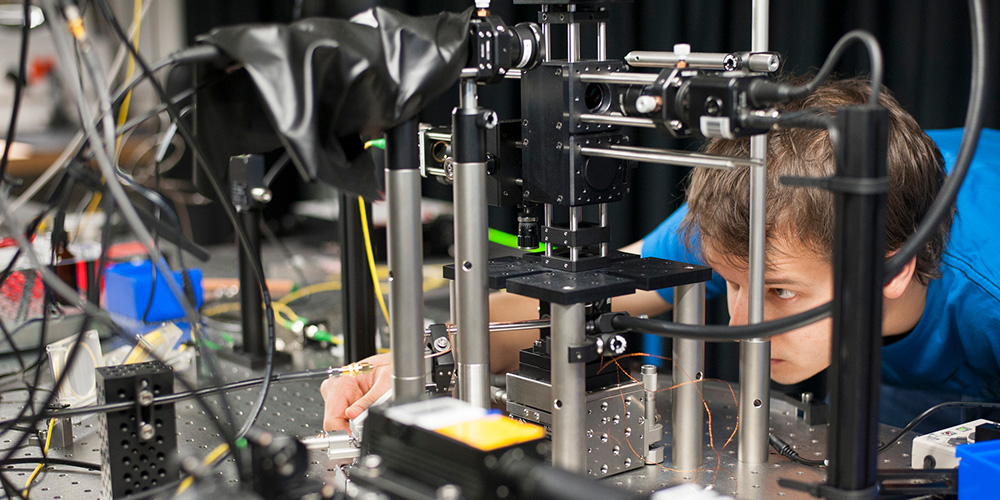Generation Quantum: 12 million euros for a doctoral program in quantum science
The European Commission has approved the proposal of Eucor – The European Campus for a new international training program for doctoral candidates in quantum science and technology. “Gen-Q” will enable 51 young scientists to complete a PhD with an international, interdisciplinary and intersectoral focus.
25 February 2025
In addition to the five Eucor universities in Germany, France and Switzerland (Universities of Basel, Freiburg, Haute-Alsace and Strasbourg as well as the Karlsruhe Institute of Technology), the Universities of Amsterdam (Netherlands) and Poznán (Poland) are also involved. The project will run for five years and totals over 12 million euros.
The doctoral program is funded by the European Union with six million euros. The Swiss State Secretariat for Education, Research and Innovation (SERI) is co-financing the project with 1.9 million euros, and the partner universities are also contributing their own resources.
“Quantum science and technology is an interdisciplinary field that explores and harnesses the rules of physics, chemistry, materials science, and computer science,” says Professor Guido Pupillo from the University of Strasbourg, scientific director of the program.
“At Gen-Q, we use this variety of perspectives to work on advanced quantum technologies, such as quantum computing and quantum sensing. To this end, we will attract a large cohort of young talented researchers from all over the world to the Upper Rhine region and to all Gen-Q European partner institutions. Thus, this program is highly important for our institutions, regions, countries and Europe.”
Interdisciplinary, intersectoral, international
The program focuses on four key areas:
- overcoming noise in quantum devices,
- scaling up complexity in so-called qubits and sensors,
- developing quantum hardware, and
- developing quantum software and hybrid computing.
The young scientists will choose between the participating institutions for their doctorate and cooperate with various regional industrial partners.
12 fellowship for the University of Basel
“The PhD training program reinforces the efforts of the Physics Department towards quantum science and technology,” says Prof. Ilaria Zardo, Professor of Experimental Materials Physics at the University of Basel.
“Gen-Q provides a platform for training 51 doctoral students, 12 of whom will receive a fellowship at the University of Basel. In total, more than half a dozen Basel research groups will participate in the program, and it is also an opportunity for us researchers to offer innovative projects in quantum science and strengthen collaboration with colleagues from other countries.”
Quantum science and technology: a priority for Eucor
“Gen-Q aims to contribute to overcoming the future challenges in European quantum science and technology and, at the same time, to train the young academic generation required to meet these challenges,” says Professor Andrea Schenker-Wicki, President of the University of Basel and of Eucor – The European Campus.
The joint program builds on many years of cooperation between the participating scientists on the Upper Rhine, in particular within the expiring doctoral program Quantum Science and Technologies at the European Campus (QUSTEC). The project also strengthens the network’s strategic focus on “Quantum Science and Technologies.” The Eucor universities are already working with partner institutions in the Netherlands and Poland in the European University Alliance EPICUR framework.
For Gen-Q, the European Grouping for Territorial Cooperation (EGTC) Eucor – The European Campus receives funding from the EU research framework program Horizon Europe in the Marie Skłodowska Curie ‘COFUND’ funding line to promote the mobility of scientists. In 2015, the five universities in the Upper Rhine region founded the first EGTC, which is made up solely of universities.



